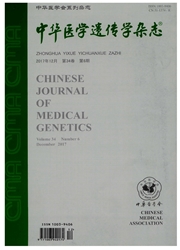

 中文摘要:
中文摘要:
目的 应用双生子设计的定量遗传分析方法探讨遗传因素与环境因素对于儿童亲社会行为的影响.方法 使用长处与困难问卷(strengths and difficulties questionnaire,SDQ)家长版本调查了147对成都地区6~16岁双生子的亲社会行为,使用SPSS13.0统计软件、Mx软件进行描述性统计分析、差异性分析、相关分析及遗传分析.结果 (1)除〈11岁组外,女性亲社会因子得分显著高于男性(P3〈0.05);(2)共享环境因素对儿童亲社会行为的贡献为0.48(95%CI:0.09~0.73),遗传因素的贡献为0.27(95%CI:0~0.66),个体特异性环境因素的贡献为0.25(95%CI:0.18~0.35);(3)女性、家庭实际及理想的亲密度和适应性越好者亲社会行为越好(r:0.17~0.29),而存在孕产期异常情况者、家长管教态度越不一致者亲社会行为越不良(r:-0.16~-0.28).结论 遗传因素和环境因素对儿童的亲社会行为均有影响,年龄和性别与儿童亲社会行为的遗传度相关,影响儿童亲社会行为的环境因素包括家庭功能和教养环境.
 英文摘要:
英文摘要:
Objective Using quantitative genetic analysis of twin study design to explore the impact of genetic and environmental factors on the prosocial behaviors of children. Methods One hundred and forty seven twin pairs from Chengdu area aged 6-16 were studied using parental information of Strengths and Difficulties Questionnaire (SDQ). SPSS13. 0 and Mx software were used to analyze data, including nonparametric test, Pearson correlation, genetic analyses, etc. Results (1) Female children score higher than males on their prosocial behavior (Ps〈0. 05), except the 〈11 age group; (2) Shared environmental factors were the most important for children's prosocial behaviors(C=0. 48,95%CI:0. 09-0. 73),then the genetic factors (A = 0. 27,95%CI:0-0. 66) and the unshared environmental factors(E=0. 25,95%CI:0. 18-0. 35) ; (3) Female and those who scored higher on their fact/ideal family adaptability and cohesion scored higher in their prosocial behaviors (r:0. 17-0. 29). On the contrary, those who had extreme conditions during pregnancy/perinatal period or whose caretaker had discordant opinions on parenting scored lower (r: -0. 16-0. 28). Conclusion Children's prosocial behaviors were influenced by genetic and environmental factors including family function and parenting environment, and genetic impact differs in different age and sex.
 同期刊论文项目
同期刊论文项目
 同项目期刊论文
同项目期刊论文
 期刊信息
期刊信息
